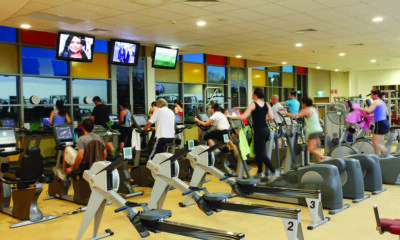Tech
How to Protect Information When using Wireless Technology
Introduction
With the rise of wireless technology, hacking and information theft have become more prevalent. While you can’t always prevent these crimes from happening, there are steps you can take to protect yourself and your personal information when using wireless devices.
Use Strong Passwords
Use Strong Passwords- Use a combination of upper and lowercase letters, numbers and symbols.
- Use a password manager to generate and store passwords.
- Don’t use the same password for multiple accounts.
- Don’t share your passwords with anyone; if you must give them out, do so only in person or via email as opposed to posting them on social media sites like Facebook or Twitter where they could be compromised more easily by hackers looking for passwords that don’t belong to them.
Keep Your Firewall Switched On
A firewall is a software or hardware device that monitors network traffic and restricts access to or from a computer or network. Firewalls are used to prevent unauthorized access to your computers, networks and other devices on the Internet. They can also be used for protection against viruses and malware infections.
Keep your wireless access point/router software up-to-date.
Keep your wireless access point/router software up-to-date.To keep your wireless access point/router software up-to-date, make sure you have the latest version. This will help prevent any security issues that could be caused by an outdated or improperly configured installation.
- Update the firmware on your wireless router by typing its model number into Google or a similar search engine. For example, if you want to update the firmware for Linksys EA6500, type “Linksys EA6500” into Google and select “Enter Keyword.” If there are multiple results from this search query (such as several links), click on one of them so that it opens in a new window—this will allow you to see what other information might be available about how exactly how many different Linksys routers exist out there in the world today!
Don’t overshare on social networking sites.
Don’t overshare on social networking sites.- Don’t share too much information.
- Don’t post things that you are uncomfortable with people seeing.
- Don’t share your passwords, location, email address and any other personal information on social networking sites like Facebook or Twitter.
It’s also important to remember that when you’re connected to Wi-Fi at a public place (such as an airport), your computer could be vulnerable to hackers who may try to obtain sensitive data from it using malicious software programs called “malware.”
Avoid open and public wireless networks.
The more people using a public wireless network, the more likely it is to be hacked. This is due to the fact that there are many other devices on the same network that can interfere with your device’s signal. It’s also possible for hackers to use multiple devices at once, which will allow them access even if only one person has access at any given time.
If you plan on using public Wi-Fi networks and want to ensure your information remains secure while doing so:
- Use https:// instead of http:// in all links (like this article) when linking directly from other websites/webpages/etc., as this will make sure all data travels over an SSL connection instead of an unsecured HTTP connection; this means no one can see what’s being sent between two computers unless they’re actively listening in on traffic between those two parties themselves!
Know Where You’re Shopping and Banking Online.
When you’re shopping online, it’s important to know where you’re checking out. If the website looks suspicious or seems like a phishing site, don’t enter any personal information! Phishing attacks are designed to trick people into giving up their passwords and other sensitive data by posing as legitimate websites.
To avoid being hacked, always double-check that the URL of your destination matches what’s listed on the bar at the top of your browser window (or in case that link is broken). And beware: if someone has control over your computer or phone (like an employee), they could send out fake emails claiming they’ve been locked out of accounts because someone else used them without permission. This is called spoofing—and while it sounds pretty innocuous at first glance, these fake messages can lead unsuspecting victims into dangerous situations with hackers who want access to their bank accounts!
Encrypt the Information You Send and Receive Online.
Encryption is the process of encoding messages or information in such a way that only authorized parties can access it.
The act of encrypting is known as encryption, while the reverse process of decrypting is known as decryption.
Encryption can be used to protect data from unauthorized eyes, but it also has many other uses. For example:
- When you use your credit card online at an ecommerce site like Amazon or eBay and enter your payment details into their checkout pages (like billing address and shipping options), those sites will need to store this information securely so they don’t get hacked by hackers who want to steal your money! The best way for them do this is through encryption technology; otherwise anyone could read through all those sensitive details like bank account numbers when they were being stored insecurely on computers owned by these companies’ employees instead.”
Use an anti-virus program to protect and maintain your computer’s health.
An anti-virus program is a security tool that helps protect your computer from viruses and other malware. The most common types of anti-virus programs are:
- AntiMalware
- AntiSpyware
- Personal Firewall
Using technology safely and responsibly can limit the risks of hacking or information theft that might come with it
Using technology safely and responsibly can limit the risks of hacking or information theft that might come with it.
- Use good passwords: Passwords should be at least eight characters long and include capital letters, numbers and special characters (i.e., @$.!%#@). You should change your password every 90 days or so to make sure you’re not using the same one over again on another account.
- Keep your firewall switched on: If you use a wireless device for work purposes, keep it turned off until after hours when no one needs access to it because this will prevent any unauthorized users from accessing data stored on those devices while they’re still connected to their own networks (i.e., if someone uses your laptop while they aren’t logged into their own networks).
- Keep your wireless access point/router software up-to-date: Software updates regularly improve security features such as firewalls and encryption protocols; updating these programs helps prevent hackers from gaining access through old vulnerabilities in outdated software versions installed on computers used by consumers online.* Don’t overshare on social networking sites: Sharing personal information is never an ideal solution when trying protect yourself against identity theft so don’t post anything about yourself that could lead someone else down a path towards stealing financial info about you such as bank accounts numbers
Conclusion
The bottom line is that you should always be careful when using wireless technology, especially if you’re sending or receiving information over the internet. The most important thing is to use strong passwords and to keep your anti-virus software up-to-date. You can also check out some of the other tips I have provided here for more protection against cyber attacks!
-

 Fashion8 months ago
Fashion8 months agoFashion designing scope in Pakistan
-

 Lifestyle4 months ago
Lifestyle4 months agoLifestyle photography ideas in 2022
-

 Lifestyle4 months ago
Lifestyle4 months agoCowboy Hat Styles and Their Creases
-

 Sports5 months ago
Sports5 months agoBest sports to play in high school
-

 Sports8 months ago
Sports8 months agoTop 10 Best Gyms In The World
-

 Tech5 months ago
Tech5 months agoHow to Fix League of Legends Disconnecting on Windows
-

 Health4 months ago
Health4 months agoHow to gain muscle for skinny guys at home
-

 Business4 months ago
Business4 months agoHow to start a real estate investment company